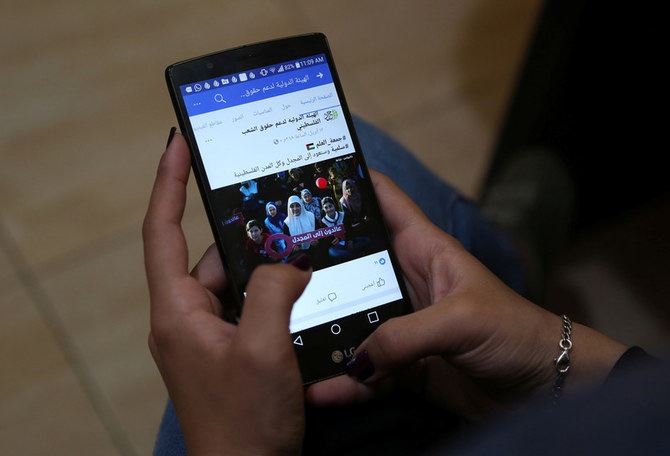LONDON: There was a “dramatic increase” in censorship of Palestinians engaging in political speech on social media during the period of intense fighting between Israel and Gaza-based militants.
A report by 7amleh, The Arab Center for the Advancement of Social Media, seen by The Independent, said that social media companies’ moderation attempts and codes of conduct have resulted in numerous citizens being censored.
Facebook, Twitter and Instagram were all used widely by Palestinian citizens and activists to share information on evictions from the East Jerusalem neighborhood of Sheikh Jarrah, among other hotbutton issues among Palestinains.
According to The Independent, 7amleh said it had documented 500 cases of what it called digital rights violations of Palestinians from May 6 to May 18.
These violations include content being taken down and accounts being removed or their visibility restricted.
Of the 500 instances, half were related to Instagram, and its parent company Facebook was found to have carried out 179 cases of censorship or other rights violations.
Facebook also engaged in geo-blocking — geographically targeted content moderation — with “a number of these cases (documented) for activists from the occupied Palestinian territory,” according to 7amleh.
The rights organization said that 45 percent of reported violations on Instagram were related to the abrupt removal of stories.
Instagram did not respond directly to 7amleh about 143 of the cases submitted, but confirmed that “only one case violated the community standards.” According to 7amleh, nearly 70 percent of reported rights violations occurred after the problem seemed to have been addressed.
Aside from content moderation problems, a number of dramatic cases of harmful and offensive content moderation occurred throughout the nearly two weeks of violence.
One notable example saw Instagram removing posts with hashtags for the al-Aqsa mosque — the third holiest site in Islam — after the tech company’s moderation system mistakenly deemed the mosque a terrorist organization.
Facebook told The Independent: “We know there have been several issues that have impacted people’s ability to share on our apps, including a technical bug that affected Stories around the world, and an error that temporarily restricted content from being viewed on the Al Aqsa hashtag page. While these have been fixed, they should never have happened in the first place.”
The company also explained that it “understand(s) that the word ‘Zionist’ is frequently used in important political debate ... that’s why we allow critical discussion of Zionists, but remove attacks against them in specific instances when context suggests the word is being used as a proxy for Jews or Israelis, both of which are protected characteristics under our hate speech policies.”
Social media is seen as an important tool by Palestinian activists and citizens who use it to tell their own stories in a global media system that, they believe, does not always portray their struggle accurately.
Marwa Fatafta, a policy manager at Access Now, told The Independent that she also believes that Facebook’s content moderation policy is biased against the Palestinians.
“Facebook's rules related to Israel-Palestinian have always been opaque and one-sided,” she said. “It's no secret that Facebook often bows to government pressure and converts such demands into rules governing online speech. But that’s only half of the story (as) social media platforms rely on algorithms to moderate speech at scale and being blind to context as they are, lots of legitimate content get flagged and taken down.”
Such issues stress the need for algorithmic transparency, which Fatafta says is “clearly biased.”
According to 7amleh, social media companies should hire specific fact checkers for the Israel-Palestine conflict, allow people to access geo-spatial data for humanitarian purposes, provide transparency on takedown requests, and conduct human rights assessments “that include the impact of Israel on Palestinians in Israel and the occupied Palestinian territory.”
Censorship and bias have been issues for years, however, and the escalation of violence over the past two weeks “only scaled it up and made it more pronounced,” said Fatafta.
She continued: “Social media has been a life-line for Palestinian activists deprived of access to mainstream media, and despite the ceasefire, the reality of occupation and oppression continues. So Palestinians will continue to use social media to organize and dissent.”
Fatafta added: “The main question here is: would social media companies learn their lessons this time?”


























